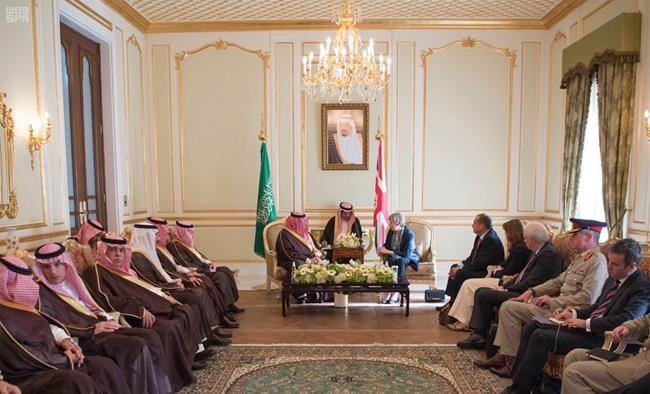Elevate your local knowledge
Sign up for the iNFOnews newsletter today!
Sign up for the iNFOnews newsletter today!
Selecting your primary region ensures you get the stories that matter to you first.

RIYADH, Saudi Arabia – British Prime Minister Theresa May arrived in Saudi Arabia on Tuesday to strengthen bilateral ties and increase trade with the largest Arab economy as it continues to spend heavily on defence and an ongoing war in Yemen.
The prime minister arrived in the OPEC powerhouse following talks in the neighbouring kingdom of Jordan.
The British government said May will emphasize her country’s close partnership with Saudi Arabia, including on counterterrorism co-operation. Before travelling to Saudi Arabia, May noted that intelligence received in the past from Saudi Arabia saved potentially hundreds of lives in the UK.
She kicked off her Riyadh visit by meeting with Saudi Arabia’s counterterrorism czar, Crown Prince Mohammed bin Nayef, who is also Interior Minister overseeing a vast array of security forces. The official Saudi Press Agency said the two discussed regional conflicts and “joint co-operation to combat extremism and fight terrorism.”
Ahead of her visit to Saudi Arabia, May also pointed to the “immense potential for Saudi investment to provide a boost to the British economy.” Energy-rich countries in the Gulf have made high-profile purchases in and around London in recent years, including several iconic properties.
Saudi Arabia, specifically, is Britain’s largest Mideast trading partner, with British exports of goods and services to the kingdom topping 6.5 billion pounds ($8.1 billion) in 2015.
Those exports include arms sales, which have drawn criticism from activists who say May should do more to pressure Saudi Arabia on its human rights record.
Saudi Arabia is among the world’s largest spenders on defence and one of the top buyers of UK defence equipment.
Numerous rights groups have called on the UK, as well as the U.S. and France, to halt the sale of weapons and military equipment being used by Saudi Arabia in its war in Yemen.
A Saudi-led coalition has been bombing Iranian allied rebels known as Houthis for two years, but has not been able to seize the capital and other territories under Houthi control.
The UK backs the coalition with technical support, precision-guided bombs and intelligence sharing.
The UK-based Campaign Against Arms Trade says the British government has licensed over 3.3 billion pounds ($4.1 billion) worth of arms to Saudi Arabia since March 2015, when Saudi Arabia began its bombing campaign in Yemen. This includes licenses for aircraft, helicopters, drones, grenades, bombs, missiles, tanks and armoured vehicles.
The war has killed at least 4,770 civilians and wounded more than 8,200 according to the U.N. office of the High Commissioner for Human Rights. The figure reflects those deaths and injuries that the U.N. Human Rights Office has managed to corroborate and confirm to be civilians.
The U.N. says in March alone, more than 100 civilians were killed, mostly by airstrikes and shelling by Saudi coalition warships. Additionally, some 21 million Yemenis, roughly 82 per cent of the population, are in urgent need of humanitarian assistance.
On Sunday, British Foreign Secretary Boris Johnson expressed his regret to Saudi Arabia’s Deputy Crown Prince Mohammed bin Salman after an activist in London tried to make a citizen’s arrest on a prominent Saudi general who frequently appears in the media to defend the kingdom’s war in Yemen.
Also, UK-based human rights organization Reprieve has called on May to raise the case of three prisoners arrested as minors in 2012 and who were sentenced to death on charges related to Arab Spring-style protests among minority Shiites demanding greater rights.
___
Batrawy reported from Dubai, United Arab Emirates.
News from © iNFOnews.ca, . All rights reserved.
This material may not be published, broadcast, rewritten or redistributed.

This site is protected by reCAPTCHA and the Google Privacy Policy and Terms of Service apply.
Want to share your thoughts, add context, or connect with others in your community?
You must be logged in to post a comment.